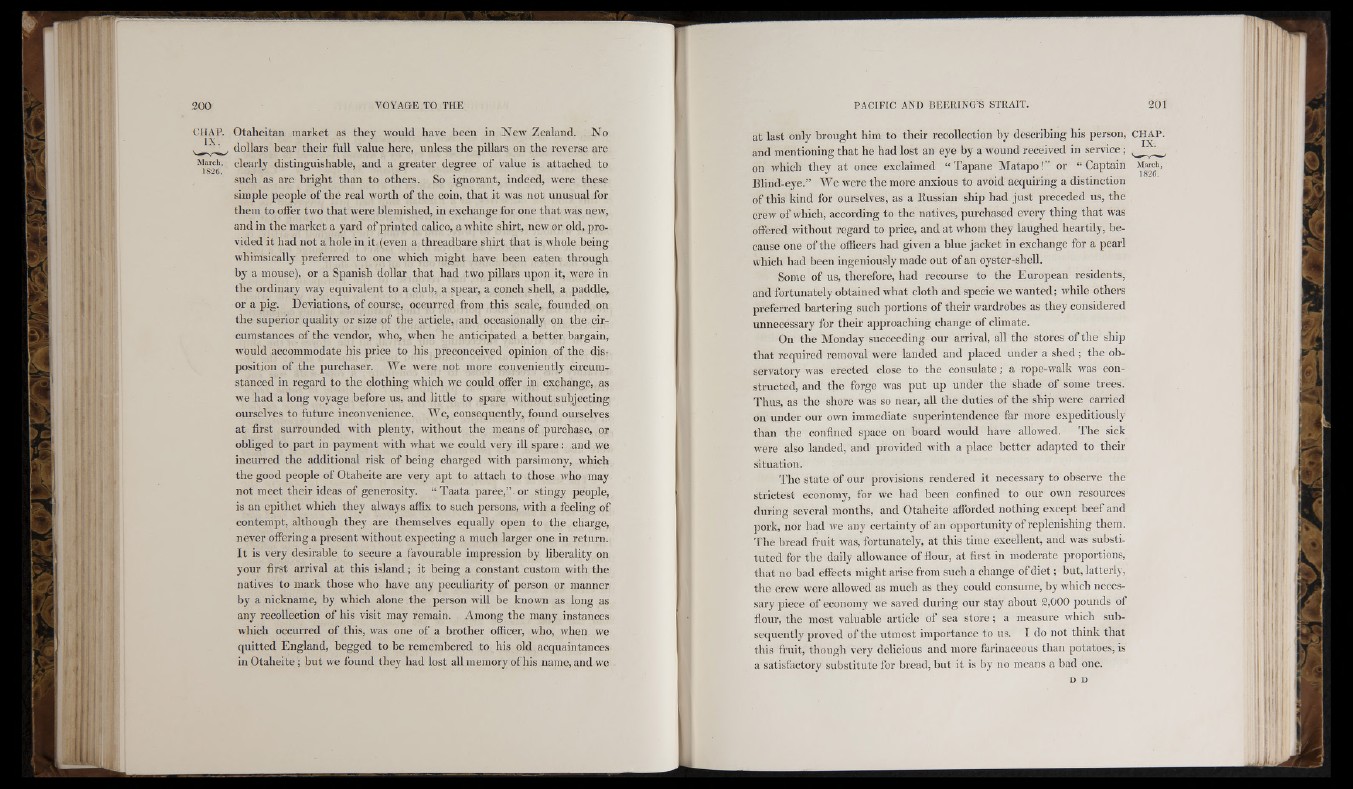
Otaheitan market as they would have been in New Zealand. No
, dollars bear their full value here, unless tlie pillars on the reverse are
clearly distinguishable, and a greater degree of value is attached to
such as are bright than to others. So ignorant, indeed, were these
simple people of the real worth of the coin, that it was not unusual for
them to offer two that were blemished, iu exchange for one tliat was new,
and ill the market a yard of printed calico, a white shirt, new or old, provided
it had not a hole in it (even a threadbare shirt that is whole being
whimsically preferred to one which might have been eaten through
by a mouse), or a Spanish dollar that had two pillars upon it, were in
the ordinary ivay equivalent to a club, a spear, a conch shell, a paddle,
or a pig. Deviations, of course, occurred from this scale, founded on
the superior quaUty or size of the article, and occasionally on the circumstances
of the vendor, who, when he anticipated a better bargain,
would accommodate his price to his preconceived opinion of the disposition
of the purchaser. YY"e were not more conveniently circumstanced
in regard to the clothing which we could offer iu exchange, as
we had a long voyage before us, and little to spare without subjecting
ourselves to future inconvenience. We, consequently, found ourselves
at first surrounded with plenty, without the means of purchase, or
obliged to part in payment witli what we could very ill spare: and we
incurred the additional risk of being charged with parsimony, which
the good people of Otaheite are very apt to attach to those who may
not meet their ideas of generosity. “ Taata paree,” or stingy people,
is an epithet which they always affix to such persons, with a feeling of
contempt, although they are themselves equally open to the charge,
never offering a present without expecting a much larger one in return.
It is very desirable to secure a favourable impression by liberality on
your fir.st arrival at this island ; it being a constant custom with the
natives to mark those who have any peculiarity of person or manner
by a nickname, by which alone the person will be known as long as
any recollection of his visit may remain. Among the many instances
which occurred of this, was one of a brother officer, who, wlien w'e
quitted England, begged to be remembered to his old acquaintances
in Otaheite; but we found they had lost all memory of his name, and we
at last only brought him to their recollection by descrilung his person, CHAP.
and mentioning that he had lost an eye by a wound received in service;
on which they at once exclaimed “ Tapane Matapo!” or “ Captain Mardi.
Eliud-eye.” We were the more anxious to avoid acquiring a distinction
of this kind for ourselves, as a Russian ship had just preceded us, the
crew of which, according to the natives, purchased every thing that was
offered without regard to price, and at whom they laughed heartily, because
one of the officers had given a blue jacket in exchange for a pearl
which had been ingeniously made out of an oyster-shell.
Some of us, therefore, had recourse to the European residents,
and fortunately obtained what cloth and specie we wanted; while others
preferred bartering such portions of their wardrobes as they considered
unnecessary for their approaching change of climate.
On the Monday succeeding our arrival, all tlie stores of the ship
that required removal were landed and placed under a shed ; the observatory
was erected close to the consulate; a rope-walk was constructed,
and the forge was put up under the shade of some trees.
Thus, as the shore was so near, all the duties of the ship were carried
on under our own immediate superintendence far more expeditiously
than the confined space on board would have allowed. The sick
were also landed, and provided with a place better adapted to their
situation.
The state of our provisions rendered it necessary to observe the
strictest economy, for we had been confined to our own resources
during several months, and Otaheite afforded nothing except beef and
jiork, nor had we any certainty of an opportunity of replenishing them.
The bread fruit was, fortunately, at this time excellent, and w'as substituted
for the daily allow ance of flour, at first iu moderate proportions,
that no bad effects might arise from such a change of d ie t; but, latterly,
the crew were allow ed as much as tiiey could consume, by which necessary
piece of economy we saved during our stay about 2,000 pounds of
flour, the most valuable artide of sea store; a measure which subsequently
proved of the utmost importance to us. I do not think that
tliis fruit, though very delicious and more farinaceous than potatoes, is
a satisfactory substitute for bread, but it is by uo means a bad one.
D u